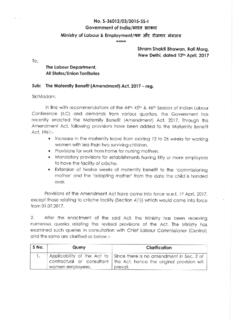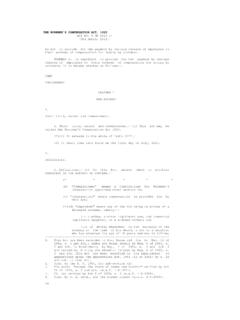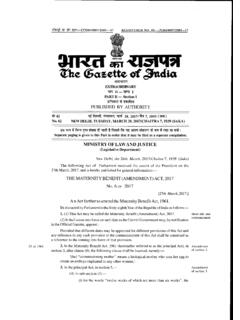Transcription of Equal Remuneration Act, 1976 - Ministry of Labour and ...
1 Equal Remuneration ACT, 1976. [Act 25 of 1976 amended by Act 49 of 1987]. CONTENTS. CHAPTER I. PRELIMINARY. 1. Short title, extent and commencement. 2. Definitions. 3. Act to have overriding erect. CHAPTER II. PAYMENT OF Remuneration AT Equal RATES TO MEN AND WOMEN. WORKERS AND OTHER MATTERS. 4. Duty of employer to pay Equal Remuneration to men and women workers for same work or work of similar nature. 5. No discrimination to be made while recruiting men and women workers. 6. Advisory Committee. 7. Power of appropriate Government to appoint authorities for hearing and deciding claims and complaints.
2 CHAPTER III. MISCELLANEOUS. 8. Duty of employers to maintain registers. 9. Inspectors. 10. Penalties. 11. Offences by companies. 12. Cognizance and trial of offences. 13. Power to make rules. 14. Power of Central Government to give directions. 15. Act not to apply in certain special cases. 16. Power to make declaration. 17. Power to remove difficulties. 18. Repeal and saving. An act to provide for the payment of Equal Remuneration to men and women workers and for the prevention of discrimination, on the ground of sex, against women in the matter of employment and for matters connected therewith or incidental thereto Be it enacted by Parliament in the Twenty-seventh Year of the Republic of India as follow: - 2.
3 Prefatory Note Statement of Objects and Reasons. Article 39 of Constitution envisages that the State shall direct its policy, among other things, towards securing that there is Equal pay for Equal work for both men and women. To give effect to this constitutional provision, the President promulgated on the 26th. September, 1975, the Equal Remuneration Ordinance, 1975 so that the provisions of Article 39 of the Constitution may be implemented in the year which is being celebrated as the International Women's Year. The Ordinance provides for payment of Equal Remuneration to men and women workers for the same work or work of similar nature and for the prevention of discrimination on grounds of sex.
4 (2) The Ordinance also ensures that there will be no discrimination against recruitment of women and provides for the setting up of Advisory committees to promote employment opportunities for women. (3) The Bill seeks to replace the CHAPTER I. PRELIMINARY. 1. Short title, extend and commencement. -- (1) This Act may be called the Equal Remuneration Act, 1976. (2) It extends to the whole of India. (3) It shall come into force on such date, not being later than three years from the passing of this Act, as the Central Government may, by notification, appoint and different dates may be appointed for different establishments or employments.
5 2. Definitions. -- In this Act, unless the context otherwise requires, -- (a) appropriate Government means . (i) in relation to any employment carried on by or under the authority of the Central Government or a railway administration, or in relation to a banking company, a mine, oilfield or major port or any corporation established by or under a Central Act, the Central Government, and (ii) in relation to any other employment, the State Government;. (b) commencement of this Act means, in relation to an establishment or employment, the date on which this Act comes into force in respect of that establishment or employment.
6 1. Ordinance 12 of 1975, promulgated by the President on Sept. 26, 1975. 3. (c) employer has the meaning assigned to it in clause (f) of Section 2 of the Payment of Gratuity Act, 1972 (39 of 1972);. (d) man and woman mean male and female human beings, respectively, of any age;. (e) notification means a notification published in the Official Gazette;. (f) prescribed means prescribed by rules made under this Act;. (g) Remuneration means the basic wage or salary, and any additional emoluments whatsoever payable, either in cash or in kind, to a person employed in respect of employment or work done in such employment, if the terms of the contract of employment, express or implied, were fulfilled.
7 (h) same work or work of a similar nature means work in respect of which the skill, effort and responsibility required are the same, when performed under similar working conditions, by a man or a woman and the differences, if any, between the skill, effort and responsibility required of a man and those required of a woman are not of practical importance in relation to the terms and conditions of employment;. (i) worker means a worker in any establishment or employment in respect of which this Act has come into force;. (j) words and expressions used in this Act and not defined but defined in the Industrial Disputes Act, 1947 (14 of 1947), shall have the meaning respectively assigned to them in that Act.
8 3. Act to have overriding effect. -- The provisions of this Act shall have effect notwithstanding anything inconsistent therewith contained in any other law or in the terms of any award, agreement or contract of service, whether made before or after the commencement of this Act, or in any instrument having effect under any law for the time being in force. CHAPTER II. PAYMENT OF Remuneration AT Equal RATES TO MEN AND WOMEN. WORKERS AND OTHER MATTERS. 4. Duty of employer to pay Equal Remuneration to men and women workers for same work or work of a similar nature.
9 -- (1) No employer shall pay to any worker, employed by him in an establishment or employment, Remuneration , whether payable in cash or in kind, at rates less favourable than those at which Remuneration is paid by him to the workers of the opposite sex in such establishment or employment for performing the same work or work of a similar nature. (2) No employer shall, for the purpose of complying with the provisions of sub-section (1), reduce the rate of Remuneration of any worker. (3) Where, in an establishment or employment, the rates of Remuneration payable before the commencement of this Act for men and women workers for the same work or work of a similar nature are different only on the ground of sex, then the higher (in cases where 4.)
10 There are only two rates), or, as the case may be, the highest (in cases where there are only two rates), of such rates shall be the rate at which Remuneration shall be payable, on and from such commencement, to such men and women workers: Provided that nothing in this sub-section shall be deemed to entitle a worker to the revision of the rate of Remuneration payable to him or her with reference to the service rendered by him or her before the commencement of this Act. 5. No discrimination to be made while recruiting men and women workers.










